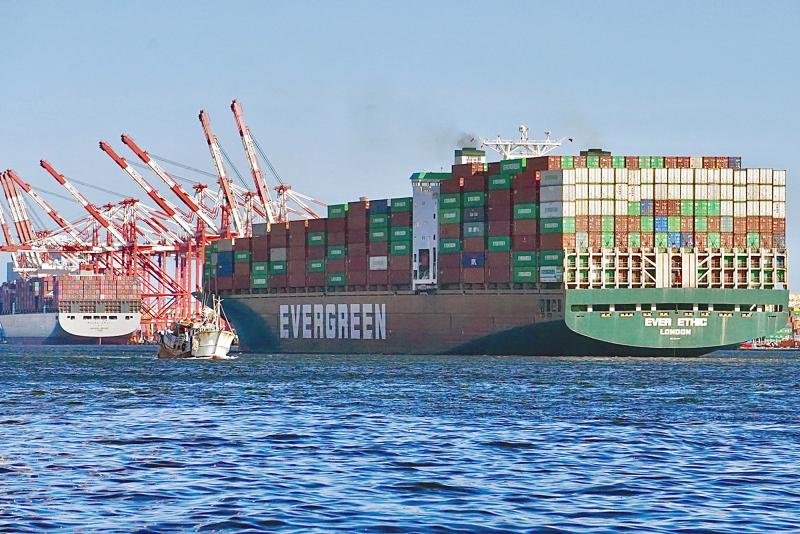Exports last month spiked 38.6 percent year-on-year to a new high of US$37.41 billion, driven by robust demand for all product categories by major countries that have been reopening their economies following progress in their vaccination drives, the Ministry of Finance said yesterday.
The increase this month might be 27 to 31 percent as the economic scene abroad looks bright, while a COVID-19 outbreak at home has had little effect on the nation’s manufacturing activity, the ministry said.
“Demand for electronics remains strong, aided by the global pursuit of new technologies, while non-tech products benefit from spending by major countries that aim to strengthen their infrastructure projects,” Department of Statistics Director-General Beatrice Tsai (蔡美娜) told an online news conference in Taipei.

Photo: CNA
A low comparison base last year also helped exports of non-tech products grow much faster than those of tech products, Tsai said.
Shipments of base metals and related products surged 54.2 percent year-on-year, while those of plastic and mineral products rose 74.7 percent and 117.3 percent respectively, she said.
Exports of transportation tools increased 58.4 percent, thanks to the growing popularity of bikes, as well as a recovery in the auto market, Tsai said.
Demand for electronics, as well as devices used in remote working and remote learning, continued to increase, she said.
Shipments of electronics products expanded 29.6 percent to US$13.27 billion, accounting for 35.5 percent of overall exports, the ministry said.
In particular, shipments of semiconductors grew 29.5 percent to US$11.93 billion, fueled by demand for new technologies, it said.
Imports rose 40.9 percent to US$31.25 billion, giving Taiwan a trade surplus of US$6.16 billion, a bump of 27.9 percent from May last year, the ministry said.
Imports of agricultural and industrial raw materials picked up 43.6 percent to US$211.83 billion, helped by price hikes, while capital equipment, a critical gauge of export needs, soared 36.5 percent, Tsai said.
Specifically, imports of semiconductor equipment picked up 46.3 percent as local tech firms aggressively acquired new equipment for technology upgrades and capacity expansion, she said, adding that chip shortages continued to plague critical sectors around the world.
Trading partners worldwide increased purchases of Taiwanese goods last month, but resurging COVID-19 outbreaks in Asia could weaken regional demand next quarter, Tsai said, citing Formosa Plastics Group (FPG, 台塑集團), Taiwan’s largest industrial conglomerate.
FPG is looking at flat sales or a mild decline in business next quarter from this quarter, as the virus outbreak weakens economic activity.
For the first five months of this year, the nation’s exports expanded 30.2 percent year-on-year to US$170.32 billion, while imports gained 26 percent to US$143.61 billion, ministry data showed.

UNCERTAINTY: Innolux activated a stringent supply chain management mechanism, as it did during the COVID-19 pandemic, to ensure optimal inventory levels for customers Flat-panel display makers AUO Corp (友達) and Innolux Corp (群創) yesterday said that about 12 to 20 percent of their display business is at risk of potential US tariffs and that they would relocate production or shipment destinations to mitigate the levies’ effects. US tariffs would have a direct impact of US$200 million on AUO’s revenue, company chairman Paul Peng (彭雙浪) told reporters on the sidelines of the Touch Taiwan trade show in Taipei yesterday. That would make up about 12 percent of the company’s overall revenue. To cope with the tariff uncertainty, AUO plans to allocate its production to manufacturing facilities in

Taiwan will prioritize the development of silicon photonics by taking advantage of its strength in the semiconductor industry to build another shield to protect the local economy, National Development Council (NDC) Minister Paul Liu (劉鏡清) said yesterday. Speaking at a meeting of the legislature’s Economics Committee, Liu said Taiwan already has the artificial intelligence (AI) industry as a shield, after the semiconductor industry, to safeguard the country, and is looking at new unique fields to build more economic shields. While Taiwan will further strengthen its existing shields, over the longer term, the country is determined to focus on such potential segments as

TAKING STOCK: A Taiwanese cookware firm in Vietnam urged customers to assess inventory or place orders early so shipments can reach the US while tariffs are paused Taiwanese businesses in Vietnam are exploring alternatives after the White House imposed a 46 percent import duty on Vietnamese goods, following US President Donald Trump’s announcement of “reciprocal” tariffs on the US’ trading partners. Lo Shih-liang (羅世良), chairman of Brico Industry Co (裕茂工業), a Taiwanese company that manufactures cast iron cookware and stove components in Vietnam, said that more than 40 percent of his business was tied to the US market, describing the constant US policy shifts as an emotional roller coaster. “I work during the day and stay up all night watching the news. I’ve been following US news until 3am

COLLABORATION: Given Taiwan’s key position in global supply chains, the US firm is discussing strategies with local partners and clients to deal with global uncertainties Advanced Micro Devices Inc (AMD) yesterday said it is meeting with local ecosystem partners, including Taiwan Semiconductor Manufacturing Co (TSMC, 台積電), to discuss strategies, including long-term manufacturing, to navigate uncertainties such as US tariffs, as Taiwan occupies an important position in global supply chains. AMD chief executive officer Lisa Su (蘇姿丰) told reporters that Taiwan is an important part of the chip designer’s ecosystem and she is discussing with partners and customers in Taiwan to forge strong collaborations on different areas during this critical period. AMD has just become the first artificial-intelligence (AI) server chip customer of TSMC to utilize its advanced